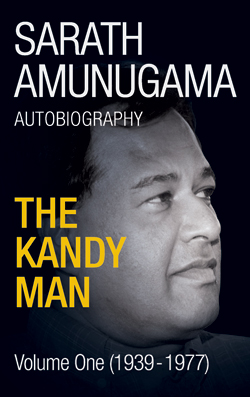A fine memoir of a tumultuous era
View(s): It took me some time to appreciate Sarath Amunugama’s title of his autobiography. I had never realized how deep rooted was the identification of Kandyan Sinhalese with the kingdom they lost in 1815.This was manifest at the triumph expressed by Sarath’s father at his son’s appointment as the first born and bred Kandyan Government Agent of a Kandyan District. I am also certain that Sarath was fully aware that his career proved the truth of Robert Knox’s apocryphal farmer who was fit to be king once his mud was washed off.
It took me some time to appreciate Sarath Amunugama’s title of his autobiography. I had never realized how deep rooted was the identification of Kandyan Sinhalese with the kingdom they lost in 1815.This was manifest at the triumph expressed by Sarath’s father at his son’s appointment as the first born and bred Kandyan Government Agent of a Kandyan District. I am also certain that Sarath was fully aware that his career proved the truth of Robert Knox’s apocryphal farmer who was fit to be king once his mud was washed off.
Sarath’s schooldays were at Kandy’s Trinity College, the last bastion of English Public School education that imbued him with English skills and social values that served him well in his career as civil servant, scholar and politician. He flourished in the University during its ‘glorious summer’ of the early 1950s. While English dominated the halls of academia, Sarathchandra and “Maname” gave birth to modern Sinhala and drama. Sarath flourished in this heady atmosphere while honing the studies on Sociology which were to be his intellectual specialty. Typical of his peers from elite schools, he too, apprenticed himself to the Samasamajist leaders of that era but NM shrewdly observed this as a passing fad.
On entering the prestigious Ceylon Civil Service he was assigned to many Districts, his final assignment being Government Agent of Matale District, where he acquired an extensive knowledge of rural society and grassroots administration. It did not take long for his unique skills to be recognised and vault him into the closest collaboration with top administrators and Cabinet Ministers. Sarath’s shrewd observations of these personages make delightful reading.
The most dramatic period of his administrative career was during the JVP Insurgency of 1971 when he had the opportunity of being close to the inner circle of the Prime Minister Mrs. Sirima Bandaranaike. He is frank in his assessment of her calm demeanour and decisive actions when the very foundations of government were tottering and many of her aides were panicking. Today it is incredible to imagine the aplomb with which she persuaded heads of many governments to provide arms and ammunition to our beleaguered forces.
Sarath was put in charge of the Department of Information and administered its mandate with professional competence. It is interesting to read his warts and all assessments of Cabinet Ministers and Presidents – their idiosyncrasies and hate objects. Nor does he shy away from discussing the relevance of caste identity in national, especially Kandyan, politics.
But no book is without flaws. There are far too many factual flaws and inaccuracies which indicate that the text has not been sifted through by a knowlegeable Editor. I urge Sarath to “do the needful”, for the next edition, as we used to say in government service.
| Book facts | |
| The Kandy Man by Sarath Amunugama Reviewed by Tissa Devendra |



